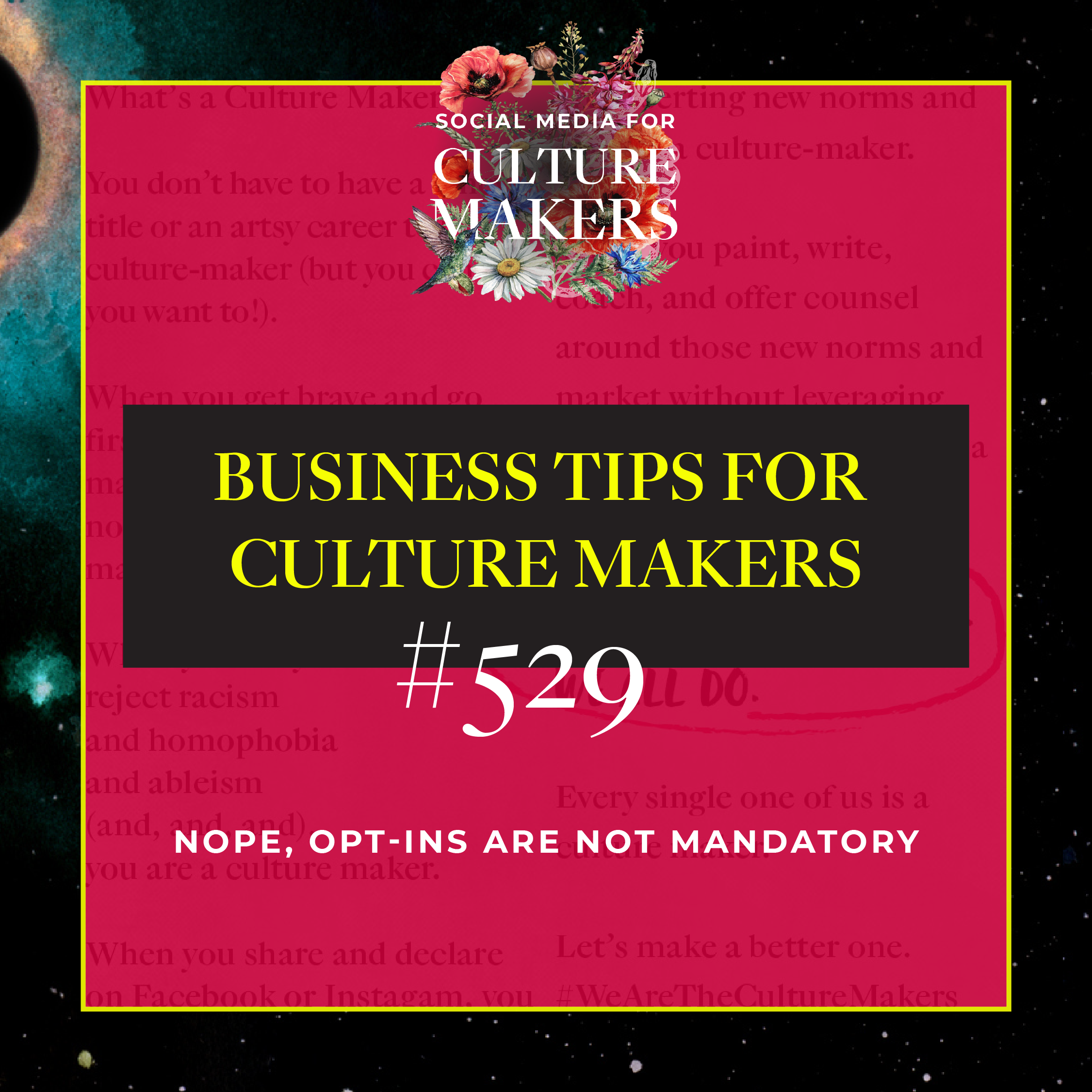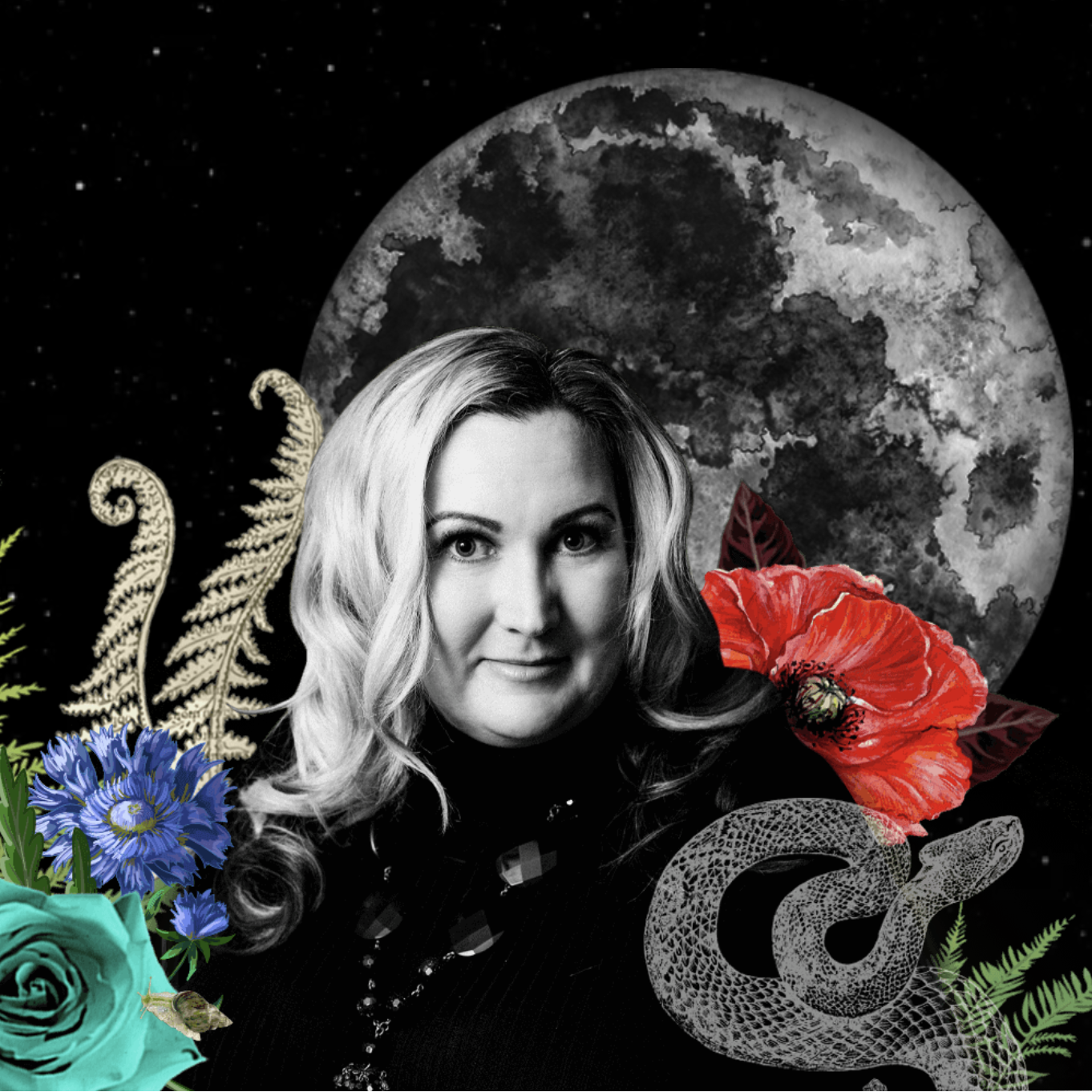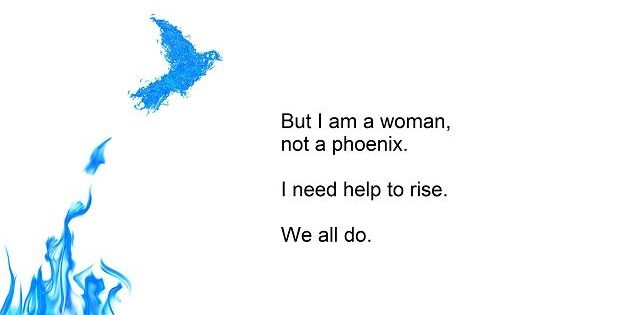
Business Tip for Culture Makers #529: Nope, Opt-Ins are NOT Mandatory

Business Tip for Culture Makers #529
What if something we do all the time in online marketing actually reinforces rape culture?
I’m talking about opt-ins. Cookies. Bait.
You know, the “sign up for my email and get this free XYZ” tactic.
First off: you don’t have to do things according to the usual formulas. Please feel wildly free to deviate.
These systems can work, but only if you feel comfortable with them.
If you don’t, or you actually object to the tactics on principle, you’re not going to use them.
Not even if you grit your teeth and resolve to ignore your spider-senses and try to muscle through.
So it’s important to plot alternative routes so you can market enthusiastically, in a way that advances your culture-making and your business objectives.
Let’s apply that insight to list opt-ins.
The conventional list-building strategies tell you to develop a free download or an ebook giveaway in order to get email subscribes.
I’ve problematized this sequence, as have other thinkers I know (a conversation with Bear Hebert* in 2017 was a massive light bulb, here) because it’s arguably an abuse of the reciprocity trigger.
Whenever you receive a gift, you feel a visceral urge to reciprocate it and it’s actually deeply uncomfortable for us not to reciprocate.
When the initiator (or marketer) offers a ‘free’ gift, it’s not really free. It’s meant to obligate you to reciprocate and usually it’s with something *they* define…and that something is usually money/sale.
The problem with this sequence is that lots of people don’t know that signing up for a newsletter + a free gift means that a sales funnel meant to get them to buy is what’s actually on offer.
Which means they’re not giving full consent, because they don’t have all the info they need to consent to this sequence.
Devaluing consent is rape culture.
As marketers not being transparent about the fact that the sign-up leads into a sales funnel, in addition to abusing the reciprocity instinct in others, we’re over-riding their consent — and devaluing consent, as we know in other contexts, has oppressive individual and cultural consequences.
Arguably, the gift-for-email sequence parallels the dynamics of rape culture.
It’s a bit of a trick because it’s not a transparent exchange with full, informed consent.
If a reader doesn’t know what they’re consenting to — a sales funnel, in this example — then there’s no real consent.
And if we care about consent and ending rape culture — and I’m guessing most culture-making entrepreneurs and humans-with-consciences do — then we’re probably going to want to make sure we’re explicitly seeking consent in all our interactions, including our email sign-ups.
So maybe opt-ins aren’t a tactic we can endorse.
Or maybe there’s a way to use them that DOES involve transparency and full consent.
I’m not trying to get you to substitute my judgment for yours or make a rule like “Thou Shalt Not Use Opt-Ins!”
Instead, I’m suggesting that as culture-making marketers we’ve got to question our assumptions and the norms of our industries…
…because a lot of our assumptions and norms are part of the problem (sexism! patriarchy! inequality! rape culture!) we’re trying to solve.
On a more prosaic note, lots of these downloads and free gifts are boring.
I’m not sure they help distinguish you in the marketplace or the minds of your audience.
(How many of the ones you’ve received do you remember?)
For years, I didn’t have an opt-in. Honestly, until recently, it wasn’t a deliberate choice borne of principles. It was laziness. I just couldn’t think of something to offer and I didn’t think they were compelling enough to really invest time and energy in one.
This may have been a marketing mistake. I might have missed out out on an opportunity to have a lot more sign-ups. Even so, that doesn’t mean my list didn’t grow. The last 20 months have been stellar in terms of list growth and list engagement.
So give yourself permission to deviate and experiment with new methods when you just don’t dig — or actually oppose — certain tactics.
Please note — again! — that I’m not in the business of making hard-and-fast rules about what you can and cannot do in your marketing.
I do not want you to substitute my judgement or critique for your own.
I want all of us to build our analyses and develop custom approaches that align with our ethics and the business & culture-making outcomes we’re trying to create.
In other words, this marketing tip is not a call to stop using opt-ins or a wholesale ban on opt-ins. Instead, I’m asking us to contextualize them and think them through so we can make deliberate decisions about the tactics we use and the outcomes we create.
You can’t fluidly market something you’re not enthusiastic about.
Here’s what I do instead of having an opt-in:
- I have a subscribe page.
- On that page, I tell people what the value of subscribing is, and I disclose that I’m going to market my products. That way they know what they’re signing up for and are actually consenting to it.
- My actual ‘transparency/full consent text’ is this: “from time to time, I’ll ask you to buy my sh*t”.
- People sign up not for a cookie or a free gift but because they actually want me to send them emails.
- I feel like it’s my job to send those emails.That’s why someone gave me their email address. If I don’t send my Sunday Love Letter, I’m not holding up my end of our agreement.
- And this gives me the confidence to send emails. I don’t feel like I’m cluttering up someone’s inbox or infringing on their head space, because the only reason they signed up was to read my emails.
- Every couple of days on FB, I post a status update and remind people I have a newsletter list. I share the link to the subscribe page…and I almost always get a little flurry of sign-ups. That doesn’t sound like a lot, but these tiny nudges a few times a week can add up to a thousand new people subscribed to your list across the year.
- I have other list-building activities and tactics, too, so there are multiple ways and opportunities for people to sign up for my newsletter. You can use a lot of incremental tactics that on their own don’t seem like a lot, but together, over time, they deliver a lot of sign-ups from people who actually want to hear from you.
Now I might be wrong about this.
Choosing to ditch the opt-in might not be the right strategy for you.
You’d have to watch your numbers and check your intuition and bodily sensations to see if ditching the opt-in and supplementing it with other tactics is the right approach for you. Definitely experiment.
But IF you don’t want to have an opt-in, then you don’t have to have one.
You can still succeed without one.
The point of this culture making business tip was simply to highlight the fact that there are lots of standard-operating-procedures in marketing that you don’t actually have to use…
…and you can figure out alternatives that deliver similar results using different tactics and processes.
This can be important if you feel like opt-ins violate consent or misuse our reciprocity instincts.
The culture-making outcomes you want to create does need to be threaded into your business and marketing.
It counts. It makes a difference.
But please know this: not using an opt-in doesn’t mean you’re therefore doomed to have *gasp* a small list.
(And you don’t necessarily need a huge list to make money — it really depends on your business model.)
You can add tweaks and adjustments and have multiple paths to subscribe AND ASK FOR CONSENT and still grow your list and achieve your goals.
You don’t have to follow the tactics others prescribe.
You don’t have to follow the strategies I outline.
You really can experiment and iterate until you find the combo that works for you…
…and that’s how you’ll hit your marketing stride. When you feel good about your own marketing tactics, you market way more enthusiastically.
And that really does change everything.
So please find methods that you feel good about and feel free to ditch ones you don’t.
Because this is your business and your culture-making. You get to decide.
* I had personally connected the dots for how the abuse-of-reciprocity is baked into conventional online opt-in sequences, and written about it in 2016 and 2017, but a conversation last year with Bear Hebert in 2017, when she pointed out it degrades or overrides consent, called this dilemma into even more radical focus.
Bear Hebert is brilliant. She coaches artists and entrepreneurs and people who hate systems in developing effective life and career systems for themselves. You can find Bear, here.
You can also find out more about how the reciprocity trigger works for yourself (it’s so revealing and instructive) in Dr. Robert Cialdini’s book, Influence (aff link — if you buy the book, I get a few dollars)
This Business Tip for Culture Makers is part of a series. You can find more of them here.
#BusinessTipsForCultuerMakers #WeAreTheCultureMakers



